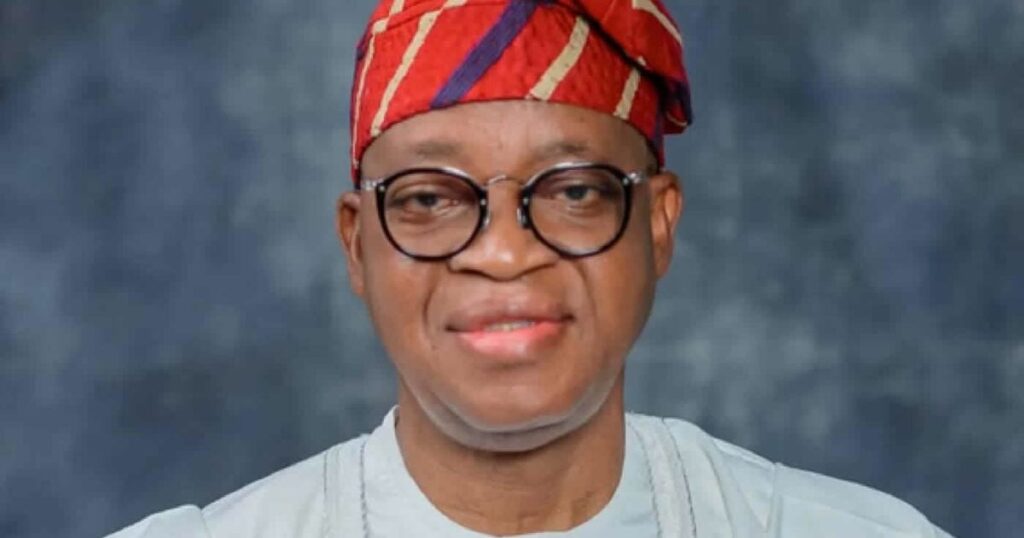The Minister of Marine and Blue Economy, Adegboyega Oyetola, has called on member states of the Union of African Shippers’ Councils to engage constructively with shipping lines and international partners to ensure transparency, fairness, and equity in the determination of surcharges and freight rates.
Oyetola stated this in Lagos on Wednesday while speaking during a two-day sub-regional seminar and meeting of the Standing Committee No. 1 on Trade and Transport under the Union of African Shippers’ Councils.
The event, themed “The Readiness of Countries of West and Central Africa in the Implementation of the Agreement Establishing the African Continental Free Trade Area – The Role of Shippers’ Councils,” was organised by the Nigerian Shippers’ Council in collaboration with the UASC.
Represented at the event by the Permanent Secretary of the Ministry, Oloruntola Olufemi, Oyetola urged the gathering to unite in establishing mutually beneficial frameworks that safeguard shippers’ interests while ensuring the sustainability of shipping services.
“It is, therefore, imperative that member states, through UASC, engage constructively with shipping lines and international partners to ensure transparency, fairness, and equity in the determination of surcharges and freight rates. Our goal must be to establish mutually beneficial frameworks that safeguard shippers’ interests while ensuring the sustainability of shipping services,” Oyetola said.
He stated that the theme was both timely and strategic, adding that it reflected the countries’ collective determination to ensure that the AfCFTA becomes not just a framework on paper but a practical instrument for driving industrialisation, trade expansion, and inclusive prosperity across Africa.
Oyetola stressed that AfCFTA presents the continent with an unprecedented opportunity, a single market of over 1.4 billion people with a combined gross domestic product exceeding $3tn.
He added that for the West and Central African sub-region, the agreement provides a viable pathway for deeper regional integration, export diversification, and enhanced participation in continental and global value chains.
Oyetola, however, explained that to unlock these opportunities, “We must confront persistent constraints, particularly in transport logistics, trade facilitation, port efficiency, and shipping costs. These are areas where National Shippers’ Councils must play a decisive and proactive role, aligning their interventions with the objectives of the African Union and the implementation roadmap of AfCFTA.”
According to him, across the sub-region, the councils occupy a strategic position as advocates of shippers’ interests and regulators of port economic activities.
The former Osun State Governor emphasised that by promoting fair freight rates, transparent shipping practices, and efficient cargo movement, they help reduce the cost of trade and enhance the competitiveness of African exports.
He explained that in Nigeria, the Federal Government, through the NSC, would continue to implement policies that strengthen port efficiency, multimodal transport connectivity, and digital trade facilitation.
“These initiatives are designed to ensure that Nigerian ports and transport corridors serve as competitive gateways for intra-African trade under the AfCFTA framework,” Oyetola stated.
“We also recognise the importance of fostering regional collaboration in the development of transport corridors, inland dry ports, and logistics hubs,” he added.
Earlier, the Executive Secretary of the NSC, Dr Pius Akutah, stated that the councils have a critical role to play.
He maintained that across the sub-region, the councils are expected to serve not only as advocates for shippers but also as regulators ensuring fair competition, transparent freight practices, and the efficient movement of goods across borders.
“We are equally concerned about the recent issue of peak season surcharges and other arbitrary charges imposed by shipping lines. These surcharges have serious implications for trade competitiveness in West and Central Africa. I believe that through constructive engagement at this forum, we can develop a unified regional position that promotes fairness, transparency, and sustainability in shipping practices,” Akutah said.
The ES highlighted that the Council, as the Ports Economic Regulator in Nigeria, continues to implement policies aimed at improving port efficiency, promoting multimodal transport, and facilitating the development of inland dry ports and logistics hubs.
Akutah pointed out that the efforts are designed to strengthen the NSC’s readiness for the effective implementation of the AfCFTA and the World Trade Organisation’s Trade Facilitation Agreement.
“We are honoured to host this important gathering, which brings together representatives from nineteen UASC member countries, ministries, departments and agencies of government, trade and logistics stakeholders, and development partners. Your presence here today reflects our shared commitment to advancing the maritime and trade agenda of our sub-region,” he said.
Also speaking, the Secretary-General of the Union of African Shippers’ Councils, Abdurahman Abba Kafougou, commended the NSC for hosting the event.
Kafougou affirmed that the initiatives reflect the dynamism of the NSC, which seeks to provide better assistance to shippers and members of the UASC.
He also advocated for harnessing the opportunities of the AfCFTA for the benefit of shippers.















